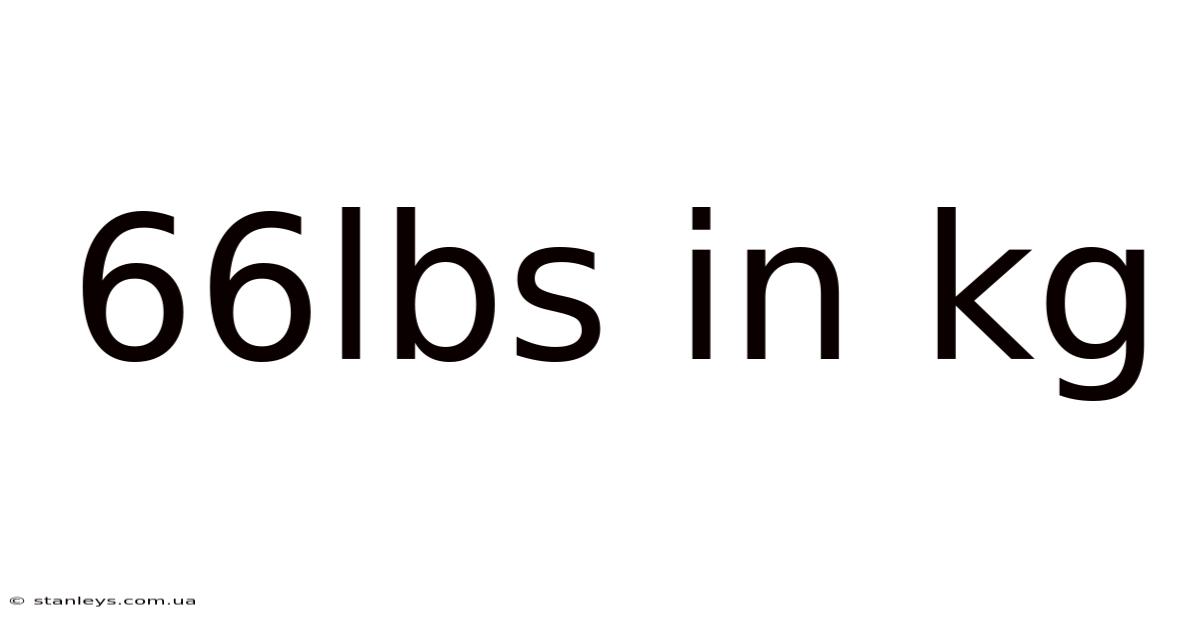66lbs In Kg
stanleys
Sep 12, 2025 · 4 min read

Table of Contents
Decoding the Weight: 66 lbs in kg and Understanding Weight Conversions
Knowing how to convert weight measurements between pounds (lbs) and kilograms (kg) is a crucial skill in today's increasingly globalized world. Whether you're traveling internationally, following a fitness plan with metric measurements, or simply understanding different units of measure, this conversion is often necessary. This article will delve deep into converting 66 lbs to kg, explain the process, and explore the broader context of weight conversion and its implications. We'll also answer frequently asked questions to ensure a comprehensive understanding.
Understanding the Units: Pounds (lbs) and Kilograms (kg)
Before we dive into the conversion, let's establish a basic understanding of the units involved.
-
Pounds (lbs): This is a unit of mass in the imperial and US customary systems of measurement. It's a common unit for measuring weight, particularly in the United States and some parts of the United Kingdom.
-
Kilograms (kg): This is the base unit of mass in the International System of Units (SI), which is the most widely used system of measurement globally. It's preferred in most scientific contexts and in many countries worldwide.
The difference between these units arises from the different systems of measurement they belong to. Understanding this difference is key to accurate conversions.
Converting 66 lbs to kg: The Calculation
The conversion factor between pounds and kilograms is approximately 0.453592. This means that one pound is equal to 0.453592 kilograms. Therefore, to convert 66 lbs to kg, we simply multiply:
66 lbs * 0.453592 kg/lb ≈ 29.937 kg
Therefore, 66 lbs is approximately equal to 29.94 kg. We round the result to two decimal places for practical purposes.
Beyond the Calculation: The Practical Implications
While the calculation itself is straightforward, understanding the context of this conversion is equally important. For example, knowing that 66 lbs is roughly 30 kg can be helpful in various scenarios:
-
International Travel: If you're traveling with luggage, understanding weight limits in kilograms is essential, especially if the airline operates under the metric system.
-
Fitness and Health: Many fitness trackers, apps, and workout plans utilize the metric system. Converting your weight to kilograms allows for accurate tracking and comparison with fitness goals.
-
Scientific Research and Data Analysis: In scientific research, consistency in units of measurement is crucial. Converting weight measurements ensures accurate data analysis and avoids potential errors.
-
International Trade and Commerce: For businesses involved in international trade, understanding weight conversions is crucial for accurate pricing, shipping, and inventory management.
Different Conversion Methods and Tools
While manual calculation is straightforward, various online converters and tools can help you quickly convert between pounds and kilograms. These tools are convenient and can help avoid manual calculation errors. However, it's still beneficial to understand the underlying calculation for a deeper understanding of the conversion process.
The Importance of Accuracy and Precision
In specific situations, high accuracy in weight conversions is crucial. For example, in pharmaceutical applications or engineering, slight discrepancies in weight can have significant consequences. In these cases, using the full conversion factor (0.453592) and maintaining precision throughout the calculation is necessary.
Frequently Asked Questions (FAQs)
-
Q: Is there a simple rule of thumb for converting pounds to kilograms?
A: A rough estimation is to divide the weight in pounds by 2.2. This isn't perfectly accurate but provides a close approximation. For precise conversions, using the 0.453592 factor is recommended.
-
Q: Can I use online converters for all my weight conversions?
A: While online converters are convenient, understanding the fundamental conversion process is beneficial. It allows you to verify results and perform calculations when internet access is unavailable.
-
Q: What if I need to convert kilograms to pounds?
A: To convert kilograms to pounds, you would use the inverse of the conversion factor. You would multiply the weight in kilograms by approximately 2.20462.
-
Q: Are there any other units of weight I should be aware of?
A: Yes, other units include ounces, grams, tonnes (metric tons), and short tons. Understanding the relationships between these units is useful for broader applications.
-
Q: Why is it important to understand different units of measurement?
A: In our increasingly interconnected world, understanding different systems of measurement fosters better communication and collaboration, avoids errors and misunderstandings, and allows for more effective participation in global activities.
Conclusion: Mastering Weight Conversions
Converting 66 lbs to kg, while seemingly a simple task, highlights the importance of understanding different units of measurement and their interrelationships. This skill is valuable across numerous disciplines and everyday situations. By grasping the fundamental conversion process and using the appropriate tools and techniques, you can confidently navigate the world of weight conversions and ensure accuracy in your calculations. Remember, while quick estimation methods are helpful, precise calculations using the appropriate conversion factor guarantee accuracy, especially when dealing with critical applications. Understanding this process extends beyond simple numerical conversion; it encompasses a broader understanding of measurement systems and their importance in a globalized world.
Latest Posts
Latest Posts
-
115lbs To Kg
Sep 12, 2025
-
23 As Fraction
Sep 12, 2025
-
144 360 X 110
Sep 12, 2025
-
Dream About War
Sep 12, 2025
-
10 Of 1000
Sep 12, 2025
Related Post
Thank you for visiting our website which covers about 66lbs In Kg . We hope the information provided has been useful to you. Feel free to contact us if you have any questions or need further assistance. See you next time and don't miss to bookmark.